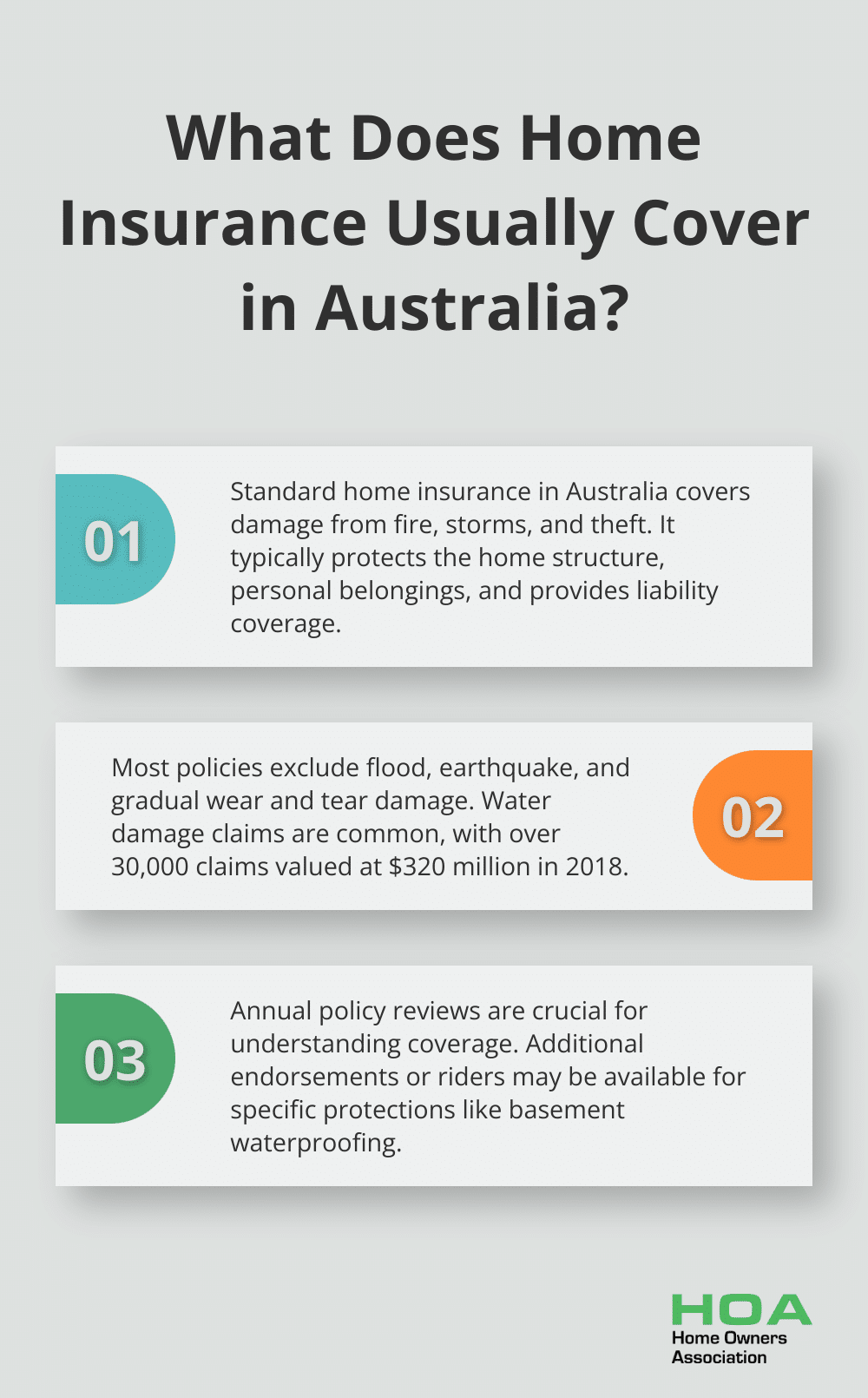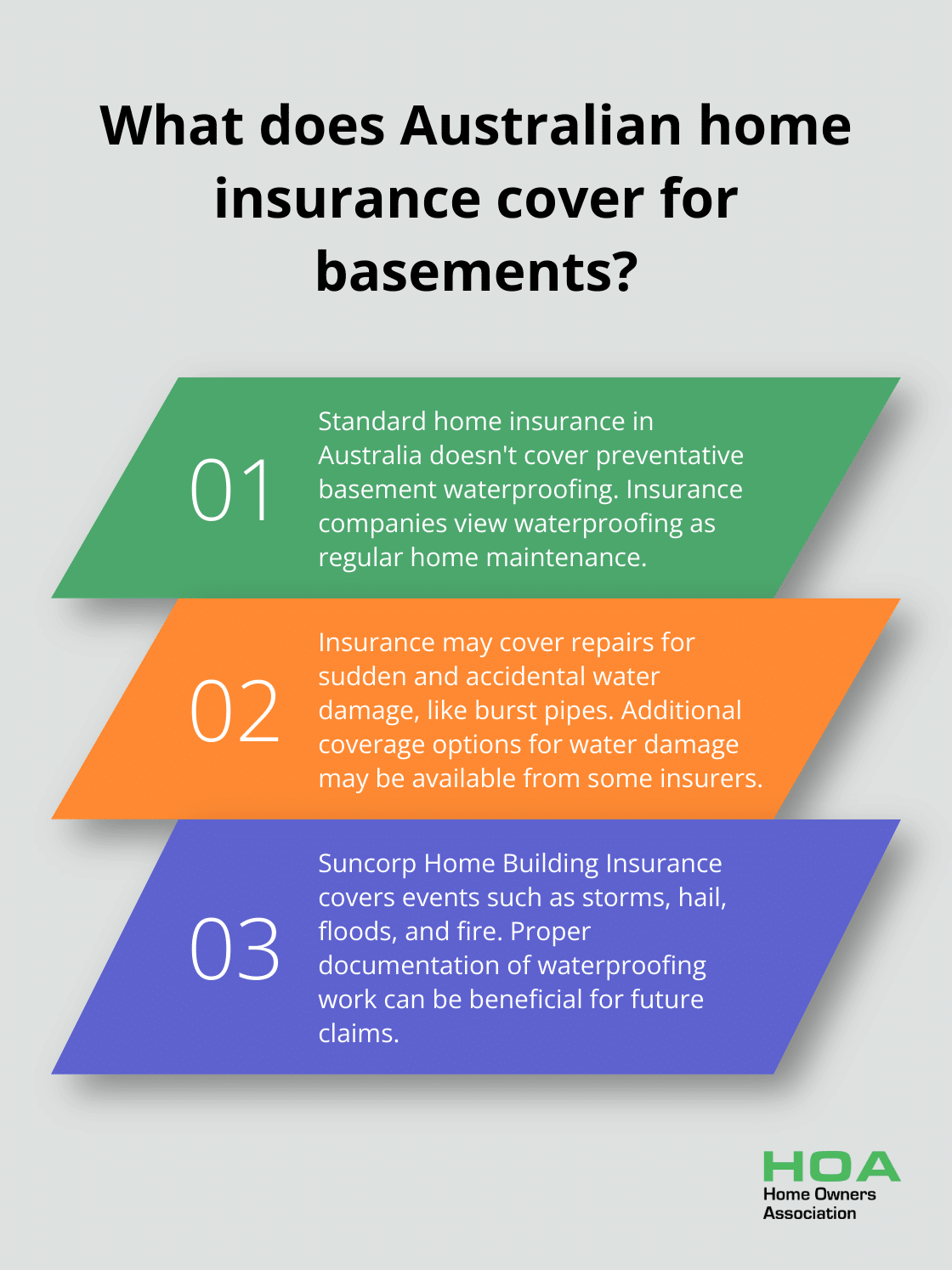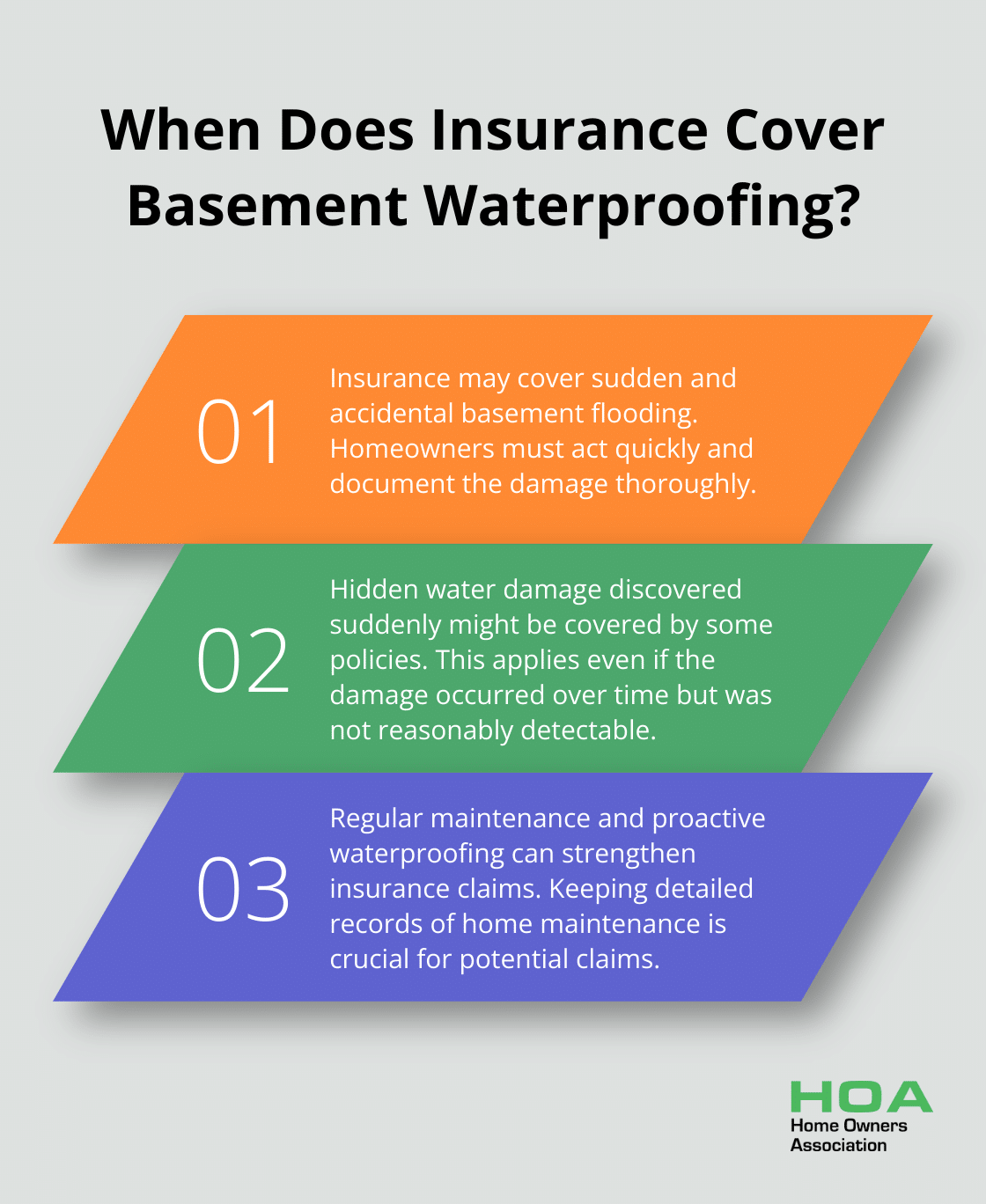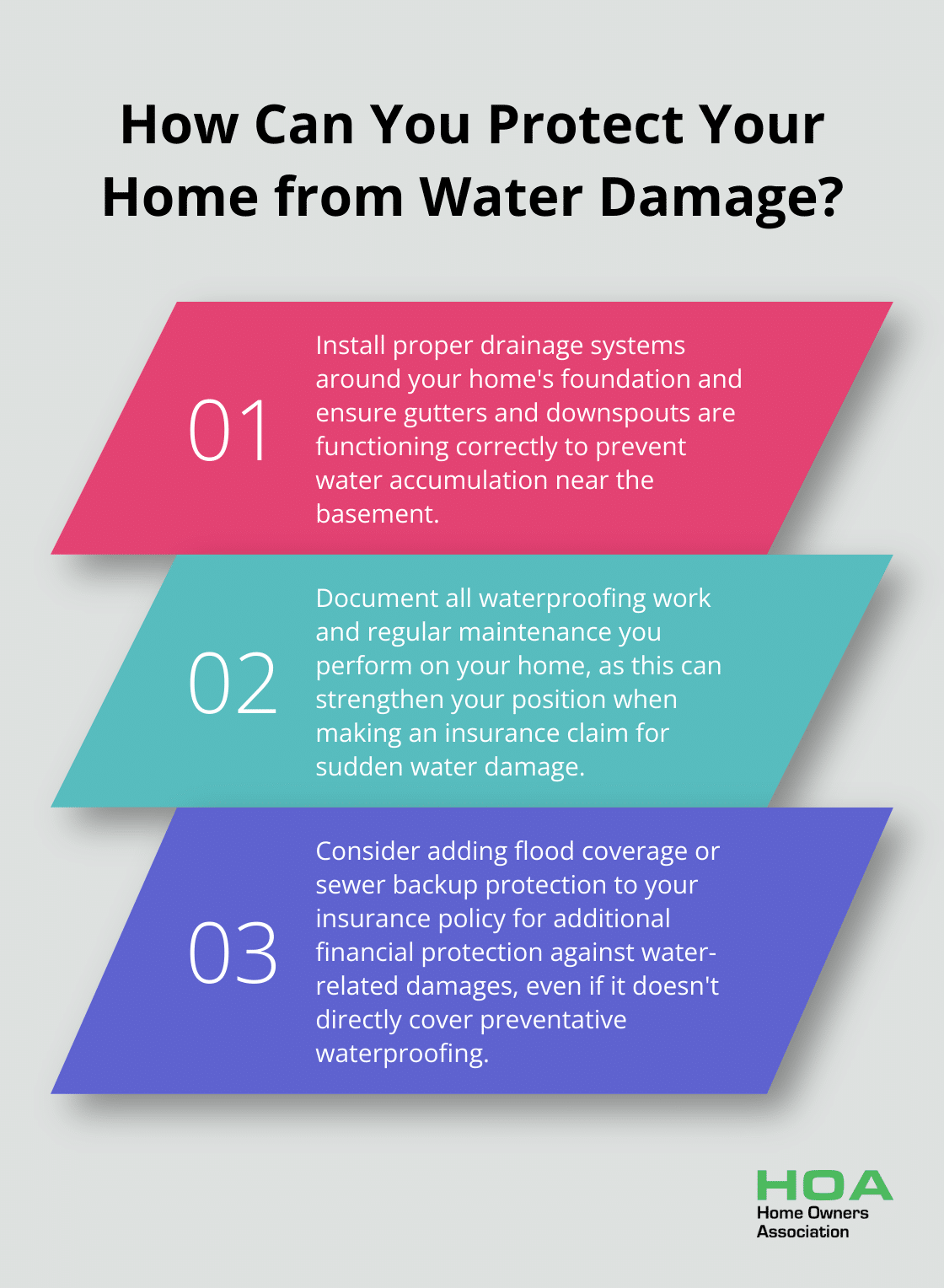
At Home Owners Association, we often receive questions about insurance coverage for basement issues. One common query is: Does home insurance cover basement waterproofing?
This crucial question can significantly impact homeowners’ financial planning and property protection strategies. In this post, we’ll explore the intricacies of home insurance policies and their relationship to basement waterproofing.
Understanding Standard Home Insurance Coverage
Basic Protection in Standard Policies
Home insurance serves as a vital safeguard for homeowners, but its coverage can be complex. Most standard home insurance policies in Australia protect against damage from events such as fire, storms, and theft. These policies typically cover the structure of your home, personal belongings, and provide liability coverage if someone sustains an injury on your property. However, it’s important to note that coverage can vary significantly between insurers and policies.
Common Exclusions in Home Insurance
While home insurance offers broad protection, it’s not all-encompassing. Many policies exclude damage from floods, earthquakes, and gradual wear and tear. Notably, most standard policies do not cover basement waterproofing as a preventative measure. The Insurance Council of Australia reports that water damage claims are among the most common, with more than 30,000 claims for water damage in 2018, valued at an estimated $320 million.
The Value of Policy Review
We cannot overemphasize the importance of thoroughly reading and understanding your insurance policy. To ensure adequate protection, you should schedule an annual review of your policy. Pay close attention to the fine print, especially regarding water damage and basement-related issues. If you’re unsure about any aspect of your coverage, contact your insurer for clarification.
Additional Coverage Options
Standard policies may not cover basement waterproofing, but some insurers offer additional endorsements or riders that can provide this coverage. It’s worth exploring these options (especially if you live in an area prone to moisture issues).

As we move forward, it’s essential to understand how insurance views basement waterproofing specifically. Let’s explore the relationship between basement waterproofing and insurance coverage in more detail.
Is Basement Waterproofing Covered by Insurance?
Understanding Basement Waterproofing
Basement waterproofing is a critical aspect of home maintenance that many Australian homeowners overlook until problems arise. This process involves the application of sealants, installation of drainage systems, or implementation of structural changes to prevent water from entering your basement. These measures are essential, especially in areas prone to heavy rainfall or with high water tables. The Australian Building Codes Board mandates proper waterproofing for all new constructions below ground level.
Common Causes of Basement Water Damage
In Australia, the most frequent causes of basement water damage include:
- Poor drainage around the foundation
- Cracks in the foundation walls or floor
- Faulty or inadequate guttering and downspouts
- Hydrostatic pressure from groundwater
Bacterial infections can also be attributed to floods, which can lead to opportunistic infections commonly seen in such situations.
Insurance and Preventative Measures
Most standard home insurance policies in Australia do not cover basement waterproofing as a preventative measure. Insurance companies typically view waterproofing as regular home maintenance, which falls under the homeowner’s responsibility.

However, if water damage occurs due to a sudden and accidental event (such as a burst pipe), your insurance might cover the repairs. But even in these cases, the coverage usually doesn’t extend to preventative measures like waterproofing.
It’s important to note that some insurers offer additional coverage options for water damage. You might be able to add flood coverage or sewer backup protection to your policy. While these don’t directly cover waterproofing, they can provide financial protection against water-related damages.
Suncorp Home Building Insurance provides cover for events like storms, hail, floods, and fire, as part of their preventative home maintenance guide.
The Value of Proper Waterproofing
We strongly recommend that homeowners invest in proper basement waterproofing, regardless of insurance coverage. The cost of waterproofing is often far less than the potential damage and disruption caused by water intrusion. Plus, a dry basement can increase your home’s value and reduce the risk of mold and structural issues.
Documentation and Future Claims
You should document all waterproofing work you undertake. In the event of a future claim, this documentation can demonstrate that you’ve taken reasonable steps to maintain your property, which could work in your favor.
While insurance might not cover preventative waterproofing, it’s a wise investment in your home’s longevity and your peace of mind. The next section will explore scenarios where insurance might cover waterproofing costs and the important distinctions between sudden damage and gradual damage.
When Does Insurance Cover Basement Waterproofing?
Sudden and Accidental Damage
Insurance providers typically differentiate between gradual damage and sudden, accidental events. Your insurance policy may cover repairs if your basement experiences sudden and accidental events. In most cases, a basic homeowner’s insurance policy will cover water damage caused by unexpected incidents. This coverage might include waterproofing measures if they are necessary to prevent immediate further damage.

For instance, if a severe storm causes your basement to flood due to a window well failure, your insurer might pay for repairs, including waterproofing the affected area. However, you must act quickly and document the damage thoroughly.
Hidden Water Damage
Some policies cover hidden water damage that homeowners discover suddenly, even if it occurred over time. If you find water damage in your basement walls that was previously concealed and you couldn’t have reasonably detected, your insurer might cover the repairs and subsequent waterproofing.
The Role of Proper Maintenance
Insurance companies expect homeowners to maintain their properties adequately. Keeping detailed records of your home maintenance (including any waterproofing measures you’ve taken) can significantly strengthen your position if you need to make a claim.
Regular inspections, prompt repairs of minor issues, and proactive waterproofing can demonstrate your commitment to property maintenance. This diligence not only helps prevent water damage but also improves your chances of a successful claim if unexpected issues arise.
Cost Considerations
While insurance might cover some waterproofing costs in specific situations, it’s always best to invest in preventative measures. The average cost of basement waterproofing can vary significantly, which is generally less than the potential costs of extensive water damage repairs.
Expert Advice
For personalized guidance on basement waterproofing and insurance coverage, consider consulting with Home Owners Association. As Australia’s leading homeowner support organization (since 1980), they offer expert advice and resources to ensure your home improvement projects meet the highest quality standards.
Final Thoughts
Home insurance typically does not cover basement waterproofing as a preventative measure. However, policies may provide coverage for sudden and accidental water damage. We recommend you review your policy carefully and consider additional coverage options if you live in a moisture-prone area.

Implement proper drainage systems, inspect for cracks or leaks regularly, and address issues promptly to protect your basement. Professional waterproofing can save you money in the long run by preventing costly water damage repairs (which can exceed $10,000 in severe cases).
At Home Owners Association, we help Melbourne homeowners navigate home maintenance and insurance complexities. Our expert advice, resources, and benefits can assist you in making informed decisions about basement waterproofing and insurance coverage.





